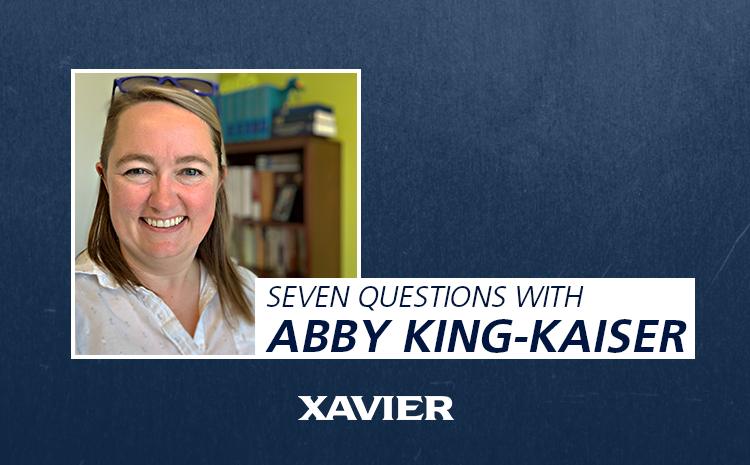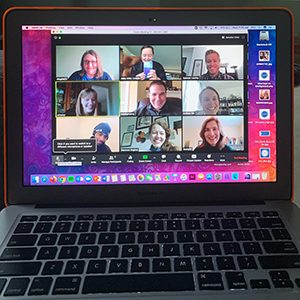
7 Questions with new Center for Faith and Justice Director Abby King-Kaiser
Aug 6, 2020
When Rev. Abby King-Kaiser first came to Xavier’s campus to work in 2012, most people thought she was still a student. But she was okay with it. In a way, starting the new job felt just like the first day of school — which in a way, it was.
Now, eight years later, King-Kaiser is starting another new school year with another new title. This summer, she was named the director of the Dorothy Day Center for Faith and Justice. With a Presbyterian background, she is a strong advocate for building bridges between people of different faiths, understanding difference and finding our common humanity.
They are traits she finds especially important right now.
We caught up with King-Kaiser to ask her about her background, her vision for the CFJ, and what exactly her first day at Xavier was like.
Xavier: What does the Center for Faith and Justice do and is it more important now than ever before?
AKK: I love that the CFJ is a unique model for what we do. About a decade ago we merged campus ministry and the Peace and Justice programs, thinking that students who may not have been interested in one or the other could come in and maybe get some crossover. Then we added a multi-faith chaplain staff. Students of other faiths might come to Xavier and be surprised that there’s a chaplain of their faith on staff, and it allows students to learn from other traditions and deepen their experience as a result. And yes, this is now more important than ever, because we’re becoming a more polarized society. The CFJ is a place where students can still come and meet others who have different beliefs — we need that exchange, and we need it to be healthy.
Xavier: What’s your background, and why did you head down this road?
AKK: I went to high school in Finneytown, and I was always really engaged in service learning. I knew about Xavier because all the students I met in my volunteer work were Musketeers. Of course, I didn’t want to go to college in my hometown, so I went to Miami of Ohio. I got an interdisciplinary degree, which was basically in community art. But I was always interested in justice issues, and I thought I might want to be a minister. So I went on to earn my Masters of Divinity degree from the Pacific School of Religion in Berkeley, Calif., and I became a minister at a parish in Oakland. Then, after a little more than a year, my church was closing, so I needed a job. At about that time, the CFJ at Xavier was looking for an ordained Protestant minister for the staff. So I applied and got the job, and moved back to Cincinnati in 2012.
Xavier: Is your vision for the CFJ different now because of the pandemic?
AKK: There are several things I think we do well here. We help students who are wrestling with the big questions. We help them find a sense of purpose. We help them learn to have reflection for the rest of their lives. We help them engage in spirituality, faith, empathy, compassion and solidarity — all aspects of our Jesuit Mission. But the world keeps changing, and you have to look at things differently now. We have to encourage the skills that embrace differences and find solidarity. We’ve looked for opportunities to do these things in new, safe, innovative ways. But it will all keep changing, and you have to be ready for that. It will always be something, and students will always need these lessons. So we have to keep changing, too. And if we do it right, maybe we can someday look back on this experience and say we learned something.
Xavier: What will Spirit Celebration look like now?
AKK: It will be remote and online. We can’t be gathered in the way we typically do across campus. But instead, we want to utilize the online format because it offers some new cool ways we can get together. The Rev. Nelson Pierce, Jr., who in on our staff and is really a leader in terms of racial justice in Cincinnati, will preach, and I’m really excited to hear him. We’ll talk about taking a hard look around, to ask what needs to changed where we are. The day will still center around the Mass, but will include other collaborations. The Center for Diversity and Inclusion will lead a discussion on the renaming of Fenwick with a remote R.E.A.D. afternoon. Our hope is the whole day feels Mission-centered.
Xavier: What would you say to someone who is interested in getting involved in CFJ at Xavier?
AKK: I would say that we have to remember that the choices we make now, they will shape who we become in the future. And it’s all heightened when you’re in college. A lot of us have spent the last five or six months very isolated. But the problems that we need to solve have to be done so collectively. Getting involved in college, and working out the big questions like: What is just? How do you connect with God? These will send you down the path to solving these global problems. And it starts in college. So it’s my hope that students start now, and make choices that reflect who they want to be in the world.

Xavier: Do you remember your first day on campus? Did you ever see yourself in this role?
AKK: No. I never saw myself in this role (laughs). My first day on Xavier’s campus was the first day of school, fall 2012. I looked young enough that everyone thought I was a student. Ever since coming to Xavier, I’ve always said I never knew what I wanted to be when I grew up, but I loved what I was currently doing. And that’s still true. Here, you can be constantly reflective, constantly discerning. It’s wonderful.
Xavier: What does the future look like for you, for the CFJ and for Xavier?
AKK: I remember once when a professor asked me what I wanted to do in the next five years. I had no idea, but I had to do the assignment, so I made a list. Some things were far off base, but some things were really accurate. I wanted to be ordained. I wanted to work on a team. I wanted to be a leader. I’ve done all of these things. Our choices set us up for our future, right? My hope for Xavier is that we become a very just University — a place for equity and access. I hope our students can become global citizens who reflect the values of our education. I think we’re working in that direction, and the same goes for the CFJ. We want to continue to be a place that builds bridges between religious and racial differences. We all get stronger if we’re building bridges. For me, I just want to keep having fun for as long as I can (laughs). I want to lead and empower this amazing staff. And I have two small children — I want Xavier to be a place that I love enough that I want them to come here.
— By Ryan Clark, Office of Marketing and Communications